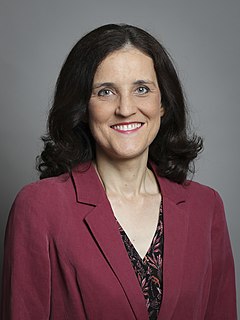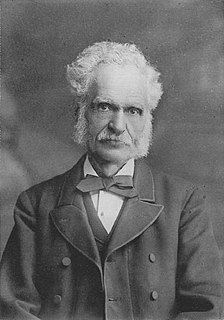A Quote by Thomas Paine
Call to mind the sentiments which nature has engraved on the heart of every citizen, and which take a new force when they are solemnly recognised by all:-For a nation to love liberty, it is sufficient that she knows it; and to be free, it is sufficient that she wills it.
Related Quotes
For many parts of Nature can neither be invented with sufficient subtlety, nor demonstrated with sufficient perspicuity, nor accommodated unto use with sufficient dexterity, without the aid and intervening of the mathematics, of which sort are perspective, music, astronomy, cosmography, architecture, engineery, and divers others.
Nature is not personal. She is the compound of all these processes which move through the universe to effect the results we know as Life and of all the ordinances which govern that universe and that make Life continuous. She is no more the Hebrew's Jehovah than she is the Physicist's Force; she is as much Providence as she is Electricity; she is not the Great Pattern any more than she is the Blind Chance.
Nor has science sufficient humanity, so long as the naturalist overlooks the wonderful congruity which subsists between man and the world; of which he is lord, not because he is the most subtile inhabitant, but because he is its head and heart, and finds something of himself in every great and small thing, in every mountain stratum, in every new law of color, fact of astronomy, or atmospheric influence which observation or analysis lay open.
Even a superficial glance is sufficient to show that all the innumerable forms in which the life-urge of Nature manifests itself are subject to a fundamental law - one may call it an iron law of Nature - which compels the various species to keep within the definite limits of their own life-forms when propagating and multiplying their kind.
The new female is competent in all that she chooses. She chooses whatever her heart tells her. She can create a business, lead a country, drive a truck, hammer nails, deliver mail, or raise a family. She is at home in every social and physical environment. She can be a housewife, if she chooses. She can be anything else, too. She is intuitive and heart centered. She is all that a female has been, and more.
The notion that Nature does not proceed by jumps is only one of the budget of plausible lies that we call classical education. Nature always proceeds by jumps. She may spend twenty thousand years making up her mind to jump; but when she makes it up at last, the jump is big enough to take us into a new age.
The universal nature has no external space; but the wondrous part of her art is that though she has circumscribed herself, everything which is within her which appears to decay and to grow old and to be useless she changes into herself, and again makes other new things from these very same, so that she requires neither substance from without nor wants a place into which she may cast that which decays. She is content then with her own space, and her own matter, and her own art.
You can call it tathata, suchness. 'Suchness' is a Buddhist way of expressing that there is something in you which always remains in its intrinsic nature, never changing. It always remains in its selfsame essence, eternally so. That is your real nature. That which changes is not you, that is mind. That which does not change in you is buddha-mind. You can call it no-mind, you can call it samadhi, satori. It depends upon you; you can give it whatsoever name you want. You can call it christ-consciousness.
The facts of nature cannot in the long run be violated. Penetrating and seeping through everything like water, they will undermine any system that fails to take account of them, and sooner or later they will bring about its downfall. But an authority wise enough in its statesmanship to give sufficient free play to nature - of which spirit is a part - need fear no premature decline.
Love is an immortal wound that cannot be closed up. A person loses something, a part of her soul, when she loves someone. And she goes about looking for that lost part of her soul, for she knows that otherwise she is incomplete and cannot be at rest. It is only when she is with the person she loves that she becomes complete again in herself; but the moment he leaves, she loses that part which he has taken with him and knows no rest till she has found him once more.





































